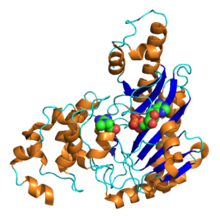| Creatine kinase | |||||||||
|---|---|---|---|---|---|---|---|---|---|
 | |||||||||
| Identifiers | |||||||||
| EC no. | 2.7.3.2 | ||||||||
| CAS no. | 9001-15-4 | ||||||||
| Databases | |||||||||
| IntEnz | IntEnz view | ||||||||
| BRENDA | BRENDA entry | ||||||||
| ExPASy | NiceZyme view | ||||||||
| KEGG | KEGG entry | ||||||||
| MetaCyc | metabolic pathway | ||||||||
| PRIAM | profile | ||||||||
| PDB structures | RCSB PDB PDBe PDBsum | ||||||||
| Gene Ontology | AmiGO / QuickGO | ||||||||
| |||||||||
Creatine kinase (CK), also known as creatine phosphokinase (CPK) or phosphocreatine kinase, is an enzyme (EC 2.7.3.2) expressed by various tissues and cell types. CK catalyses the conversion of creatine and uses adenosine triphosphate (ATP) to create phosphocreatine (PCr) and adenosine diphosphate (ADP). This CK enzyme reaction is reversible and thus ATP can be generated from PCr and ADP.
In tissues and cells that consume ATP rapidly, especially skeletal muscle, but also brain, photoreceptor cells of the retina, hair cells of the inner ear, spermatozoa and smooth muscle, PCr serves as an energy reservoir for the rapid buffering and regeneration of ATP in situ, as well as for intracellular energy transport by the PCr shuttle or circuit.[2] Thus creatine kinase is an important enzyme in such tissues.[3]
Clinically, creatine kinase is assayed in blood tests as a marker of damage of CK-rich tissue such as in myocardial infarction (heart attack), rhabdomyolysis (severe muscle breakdown), muscular dystrophy, autoimmune myositides, and acute kidney injury.[4]
- ^ Bong SM, Moon JH, Nam KH, Lee KS, Chi YM, Hwang KY (November 2008). "Structural studies of human brain-type creatine kinase complexed with the ADP-Mg2+-NO3- -creatine transition-state analogue complex". FEBS Letters. 582 (28): 3959–65. doi:10.1016/j.febslet.2008.10.039. PMID 18977227. S2CID 21911841.
- ^ Wallimann T, Wyss M, Brdiczka D, Nicolay K, Eppenberger HM (January 1992). "Intracellular compartmentation, structure and function of creatine kinase isoenzymes in tissues with high and fluctuating energy demands: the 'phosphocreatine circuit' for cellular energy homeostasis". The Biochemical Journal. 281 ( Pt 1) (1): 21–40. doi:10.1042/bj2810021. PMC 1130636. PMID 1731757.
- ^ Wallimann T, Hemmer W (1994). "Creatine kinase in non-muscle tissues and cells". Molecular and Cellular Biochemistry. 133–134 (1): 193–220. doi:10.1007/BF01267955. eISSN 1573-4919. PMID 7808454. S2CID 10404672.
- ^ Moghadam-Kia S, Oddis CV, Aggarwal R (January 2016). "Approach to asymptomatic creatine kinase elevation". Cleveland Clinic Journal of Medicine. 83 (1): 37–42. doi:10.3949/ccjm.83a.14120. PMC 4871266. PMID 26760521.
